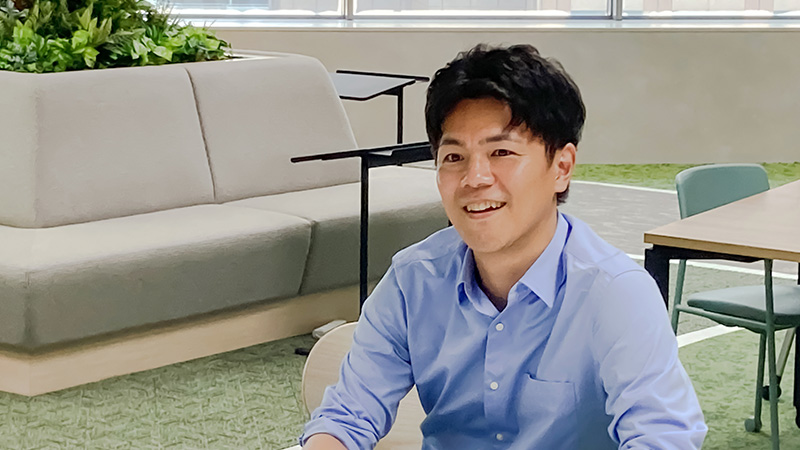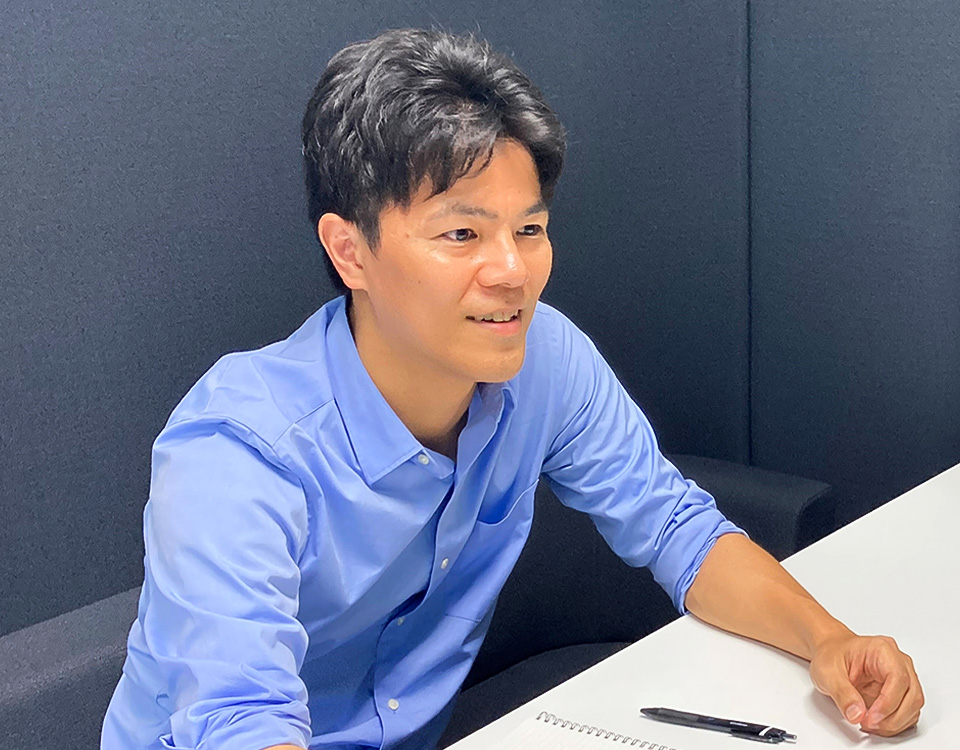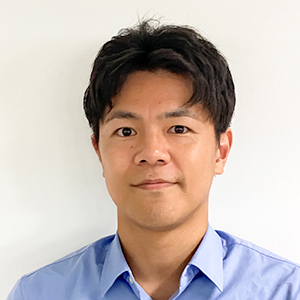
In at the deep end – straight into an assignment on joining Fujitsu Research!
Straight after joining Fujitsu Kyushu Network Technologies Limited, I was seconded to Fujitsu Research, where I was assigned to work on the development of eye tracking technology (*1), which estimates where people are looking. This technology had many diverse application requests from customers, including detecting distracted drivers and driver drowsiness, as well as behavior analysis in retail stores. However, in the early stages of development, we faced significant challenges as the accuracy was initially very low. We attempted to estimate gaze direction by detecting pupils from video footage. However, pupils shrink in bright light and reflections from eyeglass lenses obscure visibility, presenting numerous detection challenges. First, we purchased a device to fix the position of the face, and while maintaining a constant relationship between the camera and the face position, we systematically isolated the causes of inaccuracies one by one. As a result of these efforts, we eventually achieved high accuracy and it was immensely satisfying to present our achievements at various exhibitions and receive positive reactions and feedback from customers.
Committed to a career in research
After completing my secondment, I returned to my original company and resumed daily work in program development. Among various projects, one notable one involved the development of a satellite image difference detection program. In remote mountain areas, illegal dumping and logging were occurring, representing a major workload for local government patrols. By comparing past and current images, we could detect changes without physically visiting the site, enabling prompt action. I was responsible for helping to develop the image difference detection program. While I found fulfillment in such programming-focused development tasks, I realized I yearned for the excitement of developing novel technologies. With over a decade of engineering experience, I found myself wanting to make a change and engage directly in research. Consequently, I made the decision to transfer to Fujitsu Research.

Eliminating hallucinations in generative AI
Currently, I am researching the detection and suppression of hallucinations in generative AI at our Artificial Intelligence Laboratory. While generative AI has made rapid advances, the phenomenon of hallucinations represents a significant barrier to its widespread adoption. These are outputs that seem plausible but are based on errors that are not grounded in fact or established knowledge. Many voices express concerns that these hallucinations prevent the confident use of generative AI in a business context. For example, if an image of a person riding a bicycle is inputted into a generative AI system and it is asked, "Is this person violating traffic laws?", the AI might answer "No." However, upon reviewing the image, it could be seen that the bicycle was actually being ridden on a sidewalk where cycling is prohibited. In such cases, it's necessary to analyze where the generative AI has misjudged the situation and what it overlooked. If the AI did not focus on the person riding the bicycle, it's likely to be a hallucination. My focus is on meticulously analyzing how generative AI arrives at its responses, then implementing measures to detect the basis of its judgments and suppress incorrect answers. Establishing technologies for detecting and suppressing hallucinations in generative AI will enable its safe and confident use in professional applications.
Valuing a process that generates results
Several years ago, during a challenging period at work, I came across a book titled "Yes! You Can Be Absolutely Lucky!" It is all about imparting a positive mindset to believe that luck can be seized, and that achieving dreams involves understanding mechanisms and strategies. Our mindset can change our lives — thinking negatively can attract negativity, while focusing on positive aspects gradually transforms everything for the better. By changing my perspective, I learned to approach life with optimism, greatly improving my outlook during difficult times. This book has been a source of profound help and inspiration to me on many occasions, and underlines how discovering something like this book during a time of adversity can significantly alter one's life.
As we work towards creating a prosperous society, it is true to say that sometimes the work itself isn't always enriching. Many people struggle and face mental challenges. We often focus on the value of outcomes and outputs, but it's crucial also to acknowledge the process that leads to those results. However we reach a given outcome, it’s equally important to enjoy the process, or feel a sense of security. I believe that it’s not just a question of producing good results, but also essential to consider the emotions and experiences of stakeholders in order to make one’s working hours the best experience possible.
Energizing oneself with walks and travel
The move to teleworking has reduced my physical activity, and so I've started waking up a bit earlier every morning to go walking. There are rice fields around where I live, and it’s truly refreshing to go out walking while feeling the changing seasons, setting perfect tone for the day. Additionally, on weekends, I go out with my family or travel. During this year's golden week, I went to Shikoku in Japan with my wife and child, and we were able to relax and enjoy our time together. I look forward to traveling so much that as soon as one trip ends, I start planning the next! It’s about achieving a balance, cherishing values that are important to me on the one hand such as health, my family, and societal contribution, while continuing my R&D endeavors on the other.
Editor's note
In addition to the research mentioned in the article, Taku is also engaged in R&D on the integration of knowledge graphs and large language models (LLMs) (*2). One of the challenges of generative AI is that its responses can sometimes be inaccurate. However, LLMs that utilize knowledge graphs can better understand the relationships within business knowledge, thereby improving response accuracy. It is anticipated that the application of LLMs will advance in fields such as law, finance, and healthcare. People will be freed from having to read and organize large volumes of text, leading to a more fulfilling life. (Xiang Yi Peck, Technology Strategy Unit)
-
(*1)
-
(*2)
-
Notes(*1) only available in Japanese

Titles, numerical values, and proper nouns in this document are those reported when this interview was made.




